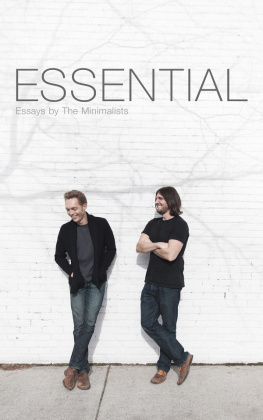Joshua Fields Millburn - Love People, Use Things
Here you can read online Joshua Fields Millburn - Love People, Use Things full text of the book (entire story) in english for free. Download pdf and epub, get meaning, cover and reviews about this ebook. year: 2021, publisher: Celadon Books, genre: Detective and thriller. Description of the work, (preface) as well as reviews are available. Best literature library LitArk.com created for fans of good reading and offers a wide selection of genres:
Romance novel
Science fiction
Adventure
Detective
Science
History
Home and family
Prose
Art
Politics
Computer
Non-fiction
Religion
Business
Children
Humor
Choose a favorite category and find really read worthwhile books. Enjoy immersion in the world of imagination, feel the emotions of the characters or learn something new for yourself, make an fascinating discovery.
- Book:Love People, Use Things
- Author:
- Publisher:Celadon Books
- Genre:
- Year:2021
- Rating:3 / 5
- Favourites:Add to favourites
- Your mark:
- 60
- 1
- 2
- 3
- 4
- 5
Love People, Use Things: summary, description and annotation
We offer to read an annotation, description, summary or preface (depends on what the author of the book "Love People, Use Things" wrote himself). If you haven't found the necessary information about the book — write in the comments, we will try to find it.
Love People, Use Things — read online for free the complete book (whole text) full work
Below is the text of the book, divided by pages. System saving the place of the last page read, allows you to conveniently read the book "Love People, Use Things" online for free, without having to search again every time where you left off. Put a bookmark, and you can go to the page where you finished reading at any time.
Font size:
Interval:
Bookmark:


The author and publisher have provided this e-book to you for your personal use only. You may not make this e-book publicly available in any way. Copyright infringement is against the law. If you believe the copy of this e-book you are reading infringes on the authors copyright, please notify the publisher at: us.macmillanusa.com/piracy.
For Rebecca and Mariah
You must remember to love people and use things, rather than to love things and use people.
Archbishop Fulton J. Sheen, circa 1925
Wish you would learn to love people and use things and not the other way around.
Drake, 2013
The streets are erumpent with uniformed men wielding titanic assault rifles. Through their megaphones, they command us to lock our doors and stay in our homes. Overhead, military helicopters blare Stayin Alive by the Bee Gees from their intercoms, the soundtrack to our new dystopian future. Bang! Bang! Two gunshots in rapid succession. I jolt awake and find my wife in bed next to me and our daughter in her room, both asleep. Walk into the living room. Retract a window shade. Look out at my neighborhood. Los Angeles. Midnight. Empty boulevards. Light rain beneath arc lamps. No sign of martial law. Only a stalled pickup at the bottom of the hill. I let out a deep sigh. Just a nightmarefortunately. But the world in which I awoke, the so-called real world, is markedly different from the one Id experienced the first four decades of my lifenot necessarily post-apocalyptic, but not normal, either.
Serpentine lines slithering through grocery-store checkout aisles. Boarded windows concealing hollowed-out Rodeo Drive storefronts. Devastating silence blanketing empty movie theaters galvanized by dust and darkness. Crowds, separated at six-foot intervals, being herded into bare-shelved food banks. Anxious families coping with being alone together while sheltering in place. Hospitals splitting open with overworked nurses and doctors whose apoplectic expressions are hidden only by their own homemade face masks. As I finished writing the final chapter of this book in the spring of 2020, the COVID-19 pandemic was seizing the globe.
Our new normal feels grossly abnormal. With the twin terrors of financial and physical uncertainty, an undercurrent of angst continues to pulse through our days. But perhaps theres a way to find calmand even to prosperin the middle of the chaos.
I didnt know it at the onset of this project, but while quarantined in my home during the pandemic, I realized Ryan Nicodemusthe other half of The Minimalistsand I had spent the last two years writing not just a relationships book but, in many ways, a pandemic-preparation manual. If only we could have gotten this book into the hands of struggling people before the spread of the virus, we would have prevented a great deal of heartache, because intentional living is the best form of preparation. When you step back, its easy to see that the so-called preppersthe embarrassment of hoarders we see on our TV screensare the least prepared for a crisis. You cant trade canned corn and ammunition for the support and trust of a loving community. You can survive, however, if you need lessand you can thrive, even in a crisis, if your relationships are thriving.
THE ENEMY ISNT ONLY CONSUMERISM NOWITS DECADENCE AND DISTRACTION, BOTH MATERIAL AND NOT.
A pandemic has a sneaky way of putting things in perspective. It took a catastrophe for many people to understand that an economy predicated on exponential growth isnt a healthy economyits a vulnerable one. If an economy collapses when people buy only their essentials, then it was never as muscular as we pretended.
The minimalist movement described in this book first gained popularity online in the aftermath of the 2008 crash. People were yearning for a solution to their newly discovered problem of debt and overconsumption. Alas, over the past dozen years, weve once again grown too comfortable. But the enemy isnt only consumerism nowits decadence and distraction, both material and not.
Amid the panic of the pandemic, I noticed many folks grappling with the question Ryan and I have been attempting to answer for more than a decade: What is essential? Of course, the answer is highly individual. Too often, we conflate essential items with both nonessential items and junk.
In an emergency, not only must we jettison the junk, but many of us are forced to temporarily deprive ourselves of nonessentialsthose things that add value to our lives during regular times but arent necessary during an emergency. If we can do this, we can discover what is truly essential, and then we can eventually reintroduce the nonessentials slowly, in a way that enhances and augments our lives but doesnt clutter them with junk.
To complicate matters, essential changes as we change. What was essential five years agoor even five days agomay not be essential now, and so we must continually question, adjust, let go. This is especially true during a crisiswhere a week feels like a month; a month, a lifetime.
Stuck in their homes, people wrestled with the fact that their material possessions matter less than they originally thought. The truth was all around them. All the things collecting dusttheir high-school baseball trophies, dusty college textbooks, and broken food processorswere never as important as people. The pandemic magnified this reality and demonstrated a crucial lesson: our things tend to get in the way of whats truly essentialour relationships. Human connection is missing from our lives, and it cant be purchasedit can only be cultivated. To do so, we must simplify, which starts with the stuff and then extends to every aspect of our lives. This book was written to help regular people like you and me deal with the external clutter before looking inward and addressing the mental, emotional, psychological, spiritual, financial, creative, technological, and relational clutter that weighs us down and disrupts our connection with others.
If you have followed The Minimalists for any time at all, you will recognize bits and pieces of our story in the Introduction to Living with Less chapterdeath, divorce, a Packing Party. But these elements arent only for new readers. In this book we take a deeper dive into the the struggles, insecurities, substance abuse, addiction, infidelity, zealotry, heartache, and pain that were the catalysts for lasting change in our lives. Then, once those details are on the table, we explore new territory as we navigate the seven essential relationships that make us who we are.
THE BEST TIME TO SIMPLIFY WAS A DECADE AGO; THE SECOND-BEST TIME IS NOW.
This isnt a book written for a pandemicits a guidebook for everyday life. The pandemic has simply heightened our everyday problems and rendered them even more urgent. With the most recent financial downturn and a renewed search for meaning, our society will be coping with some critical realities in the not too distant future. Many new norms have been established; others will continue to form as we move forward. Some of us will attempt to cling to the pastto return to normalbut thats like struggling to hold a block of ice in our hands: once it melts, its gone. Ive been asked, When is this going to turn around? But turning around presupposes that we should return to the past, to a normal that wasnt working for most peopleat least not in any meaningful way. While I dont know what the future holds, I know we can emerge from this uncertainty with a
Font size:
Interval:
Bookmark:
Similar books «Love People, Use Things»
Look at similar books to Love People, Use Things. We have selected literature similar in name and meaning in the hope of providing readers with more options to find new, interesting, not yet read works.
Discussion, reviews of the book Love People, Use Things and just readers' own opinions. Leave your comments, write what you think about the work, its meaning or the main characters. Specify what exactly you liked and what you didn't like, and why you think so.

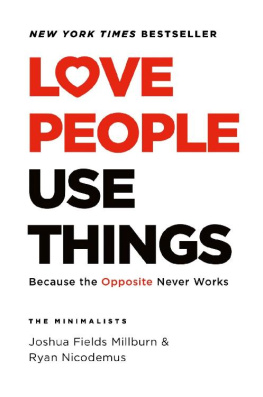

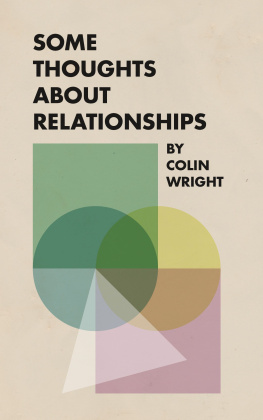
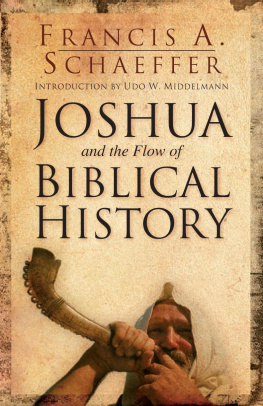
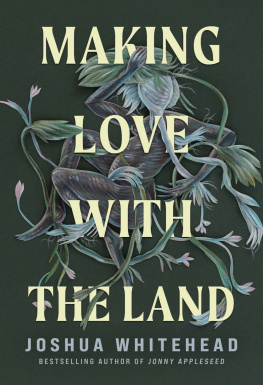
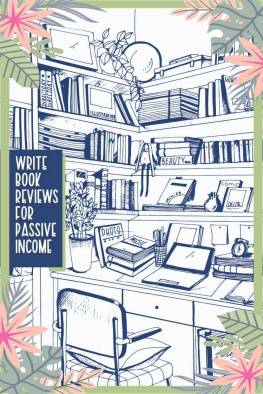
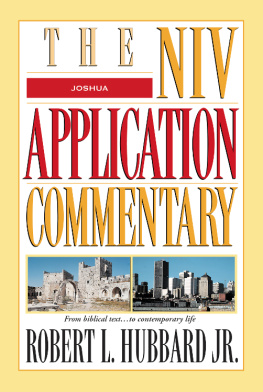
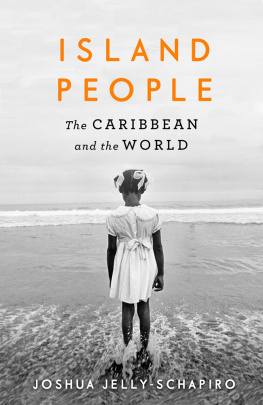
![Joshua Backfield [Joshua Backfield] - Becoming Functional](/uploads/posts/book/120483/thumbs/joshua-backfield-joshua-backfield-becoming.jpg)
